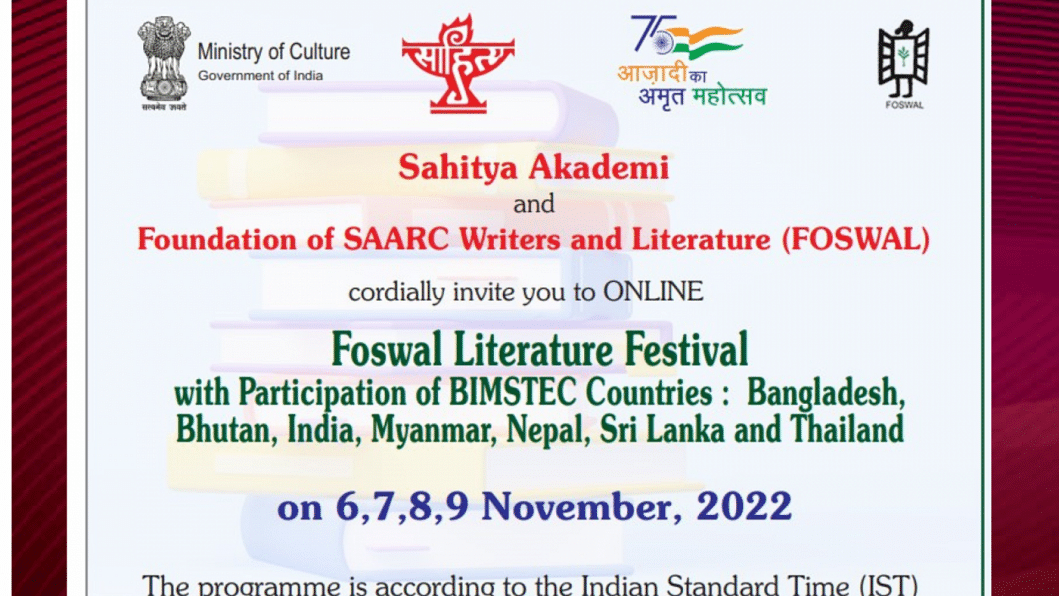Bangladesh at the FOSWAL Literature Festival November 2022

Every year writers, poets and literary scholars from SAARC countries meet on one platform to celebrate various fields of literature. The literary festival was initiated in 1987 by renowned writer and recipient of Padma Shri Award, Ajeet Cour. Her aim is to make the cultural bond between the SAARC countries stronger. This year the second FOSWAL (Foundation of SAARC Writers and Literature) literary festival of the year 2022 was held on the 6-9 November. The 4-day long online literary festival was organized by FOSWAL in collaboration with Sahitya Akademi.
The welcome address in the inaugural session was made by K. Sreenivasarao, Secretary of Sahitya Akademi. Ajeet Cour made the presidential address and she graced almost every session throughout the four days. All the twenty sessions of the festival went live on youtube.
Similar to previous years, many writers, poets and academicians from Bangladesh participated in literary festival that took place during early November. On the first day of the conference, the fiction panel was chaired by the renowned Bangladeshi writer Dr. Selina Hossain, while on the same day, in the poetry panel, poets like Anisul Hoque, Tushar Kabir and Manzur Raman read from their works. The eighth session of fiction readings that took place on the second day was chaired by Dr Sohana Manzoor, a writer and translator from Bangladesh. In the session, Jharna Rahman read her short story "The Remains of Religion" translated by Marzia Rahman. Followed by Jharna Rahman, participants from India and Sri Lanka also shared their work with the audience.
After a fifteen-minute break, the ninth session of paper presentation began. Dr Ashraf Jewel presented his paper titled "Bengali Literature from Ancient to Contemporary: An Overview." The highlight of the session Professor Fakrul Alam's paper in which he shared his journey with his favorite books. From Lawrence, Austen and Melville, Prof Alam finally traveled back to Bangla literature. He found beauty in Jibanananda Das' poems and kept returning. He mentioned that above all Rabindranath Tagore's Gitabitan wins to be his favorite. Anand Kumar chaired the ninth session.
Among other papers from other sessions, Prof. Niaz Zaman's |discussion of the prose of Kazi Nazrul Islam drew interest. She mentioned a total of eighteen short stories by Kazi Nazrul Islam that are collected in three anthologies. She also discussed his three novels, Bhadhon Hara (Unfettered), Mirthu Khuda (Deathly Hunger or Hunger for Death) and Kuhelika (The Enigma). His novels not only capture the romantic aspects of life but also reflect on the unspoken side of women in 'purdah' (veil). Dr Zaman concluded her talk by encouraging the audience to read more of Kazi Nazrul Islam's novels.
It is always refreshing to hear from Professor Syed Manzoorul Islam. The fourteenth session began with his poignant words about fostering a human community that lies beyond borders. He insisted that the platform of FOSWAL can be one place where people of all creed, religions and gender might speak from. He spoke about different crises that have plagued the people of the Indian Subcontinent and how such themes have been treated in the literary pieces of Rabindranath Tagore and Kazi Nazrul Islam. He also asked the viewers to be aware of conflicts that often travel across borders, and how great literature keeps on addressing these problems. Professor Islam merged his ideas with the ideology of FOSWAL for connecting the SAARC countries.
Among other notable Bangladeshi presenters in the conference there were Bimal Guha, Kamrul Hasan, Rubana Huq and Rokeya Islam. The concluding remarks were addressed by Ajeet Cour.
The beauty of the four-day literary festival is that it unites everyone under one roof. Thirty-five years and still counting.
Fouzia Jahan is a graduate of University of Liberal Arts Bangladesh.V

 For all latest news, follow The Daily Star's Google News channel.
For all latest news, follow The Daily Star's Google News channel. 








Comments